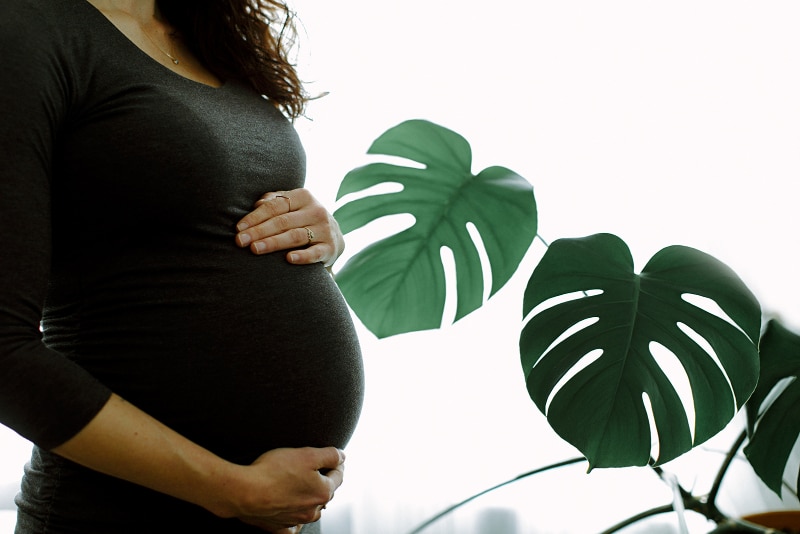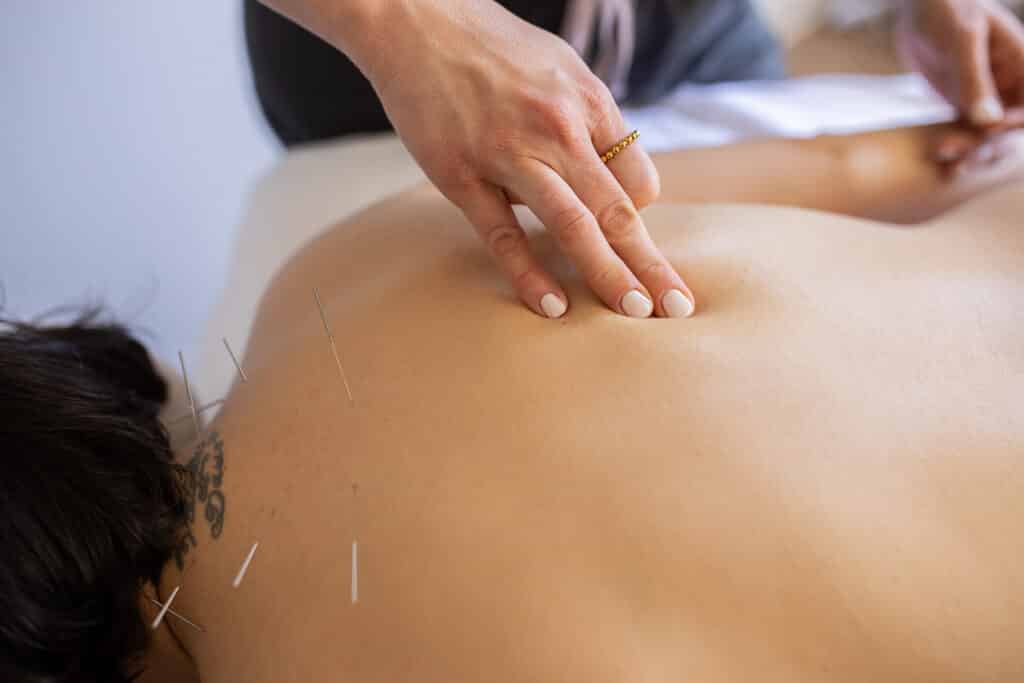
If you’ve noticed your digestion changing during your 40s, you’re not imagining it. Bloating, constipation, diarrhea, or unpredictable food sensitivities can all appear during the hormone shifts of perimenopause. These perimenopause digestive issues can feel frustrating and confusing, especially when you’ve never had gut trouble before.
The good news is that you don’t have to just live with them. At Willow Tree Clinic in Portland, we specialize in women’s health acupuncture and support for every stage of life. If your gut has been giving you trouble, now is the time to schedule an appointment and start feeling better.
Our clinicians provide focused care for women navigating hormonal transitions, from menstrual changes to perimenopause and menopause. Led by Dr. Kiné Fischler, our clinic offers compassionate, evidence-based acupuncture alongside herbal medicine, nutrition guidance, and trauma-informed care.
We’re here to help you understand what’s happening in your body and to create a personalized plan that gets you back to feeling well.
Why Perimenopause Affects Digestion
During perimenopause, estrogen and progesterone start to fluctuate. These hormones don’t just regulate your cycle, they also influence your digestive system.
Estrogen helps keep the gut lining healthy and affects how quickly food moves through the intestines. Progesterone can slow things down, often leading to constipation or bloating.
When hormone levels rise and fall unevenly, the digestive tract feels the effects. That’s why women often report new or worsening symptoms during this stage. Stress, sleep changes, and the natural aging of the gut microbiome can also add to perimenopause digestive issues.

Common Digestive Issues During Perimenopause
Every woman’s experience looks a little different, but some of the most common digestive complaints during perimenopause include:
- Bloating and gas – Shifts in gut motility and microbiome changes can leave you feeling uncomfortable.
- Constipation – Progesterone slowdowns, plus decreased muscle tone in the intestines, often contribute.
- Diarrhea or loose stools – Some women swing the other way, especially around fluctuating hormone spikes.
- Food sensitivities – Suddenly reacting to dairy, gluten, or spicy foods is a common story.
- Irritable Bowel Syndrome (IBS)-like symptoms – Hormonal shifts can worsen existing IBS or mimic its patterns.
These changes can make it harder to eat the foods you love, enjoy social meals, or simply feel comfortable in your body. Plus, you may be dealing with other perimenopause symptoms as well, like mood swings, sleep disturbances, and body aches.
What You Can Do to Support Your Digestion
Small daily changes can make a big difference for digestive comfort during perimenopause. Try these strategies:
- Eat more fiber – Good nutrition is key to maintaining your health during menopause and perimenopause. Whole fruits, vegetables, and grains keep things moving and support healthy gut bacteria.
- Stay hydrated – Water helps prevent constipation and keeps digestion smooth.
- Limit irritants – Alcohol, caffeine, and highly processed foods often make symptoms worse.
- Eat mindfully – Slow down at meals and chew thoroughly to ease the digestive load.
- Manage stress – Stress hormones directly affect gut function. Practices like breathwork, walking, or journaling can help.
Even with healthy habits, some women still struggle. That’s when professional support can make all the difference.

When to Seek Help
If digestive changes are interfering with your daily life, it’s time to reach out. Symptoms like ongoing constipation, persistent bloating, pain after eating, or sudden food reactions aren’t “just part of aging.” They’re signals that your body needs care.
At Willow Tree Clinic, we take these symptoms seriously. Whether you’re managing mild discomfort or dealing with disruptive gut changes, we work with you to address the root causes of perimenopause digestive issues.
Acupuncture and Digestive Health
Acupuncture is a powerful tool for regulating digestion. By calming the nervous system, improving circulation, and reducing inflammation, acupuncture can ease many of the gut problems that arise during perimenopause. It also supports hormone regulation, which helps address the source of these shifts rather than just masking the symptoms.
At Willow Tree, we create individualized treatment plans designed around your unique needs. We often combine acupuncture with herbs, nutrition guidance, and lifestyle support for lasting relief. If you’d like to learn more about how we approach gut health, visit our page on acupuncture for digestion.
Finding Support Beyond the Gut
Perimenopause brings changes that reach far beyond digestion, hot flashes, sleep disruptions, mood swings, and more. If you’re looking for a deeper dive into this life transition, Dr. Kiné Fischler also offers The Transformational Alchemy of Menopause, an online course that helps women navigate this powerful stage with clarity and support.

Take the First Step Toward Relief
You don’t have to struggle silently with perimenopause digestive issues. With the right support, your digestion (and your overall well-being) can improve. If you’ve been searching for “Chinese medicine near me” in Portland, Willow Tree Clinic is here for you.
Our compassionate, trauma-informed approach helps women feel seen, supported, and empowered. Whether you’re facing uncomfortable gut changes, hormone symptoms, or both, we’ll create a treatment plan tailored to your needs. Schedule your consultation today and start feeling like yourself again.

Fire Horse Rising: What This Lunar New Year Is Asking of Your Body & Heart
Fire Horse Rising: From Shedding to Galloping February 17 marks the Lunar New Year and a powerful energetic shift — from the Yin Wood Snake

What Is the Chinese Medicine Clock? How Your Organs Follow a 24-Hour Rhythm
Ever notice your body follows a schedule of its own? The chinese medicine clock offers a simple way to understand sleep, energy, and symptoms through a 24-hour rhythm. Learn how this ancient map connects to modern life and how acupuncture at Willow Tree Clinic in Portland helps bring your body back into sync.
How Often Should You Get Fertility Acupuncture for IVF? (Hint: Start Earlier Than You Think)
How Often Should You Get Fertility Acupuncture for IVF? (Hint: Start Earlier Than You Think) If you’re preparing for IVF, you’re probably juggling a lot

Pregnancy Acupuncture Near Me: Why Portland Moms Choose Willow Tree for Nausea, Reflux, Fatigue & More
Searching for pregnancy acupuncture near me? At Willow Tree Clinic in Portland, we support nausea, reflux, fatigue, sleep issues and pain throughout pregnancy. Learn how acupuncture offers safe, evidence-informed relief and why Portland moms choose Willow Tree for personalized prenatal care that actually feels supportive.

Dry Needling vs Acupuncture: What You Need to Know
When it comes to dry needling vs acupuncture, the conversation often misses a critical point: dry needling is actually trigger point acupuncture, performed without full acupuncture training. While both use needles, the level of education, safety standards, and treatment approach are very different. This article breaks down the real differences, explains why credentials matter, and highlights how acupuncture can be both highly effective and gentle when done by properly trained professionals.

Acupuncture for Hashimoto’s: How It Helps Calm Your Immune System and Support Your Thyroid
Hashimoto’s isn’t just a thyroid issue. It can affect sleep, mood, digestion, cycles, and energy. At Willow Tree Clinic, our Portland OR acupuncture care supports the nervous system and helps settle immune overdrive, so symptoms feel more manageable. We pair acupuncture for Hashimoto’s with practical nutrition and, when needed, customized herbal support for steady, whole-body progress that fits real life.
